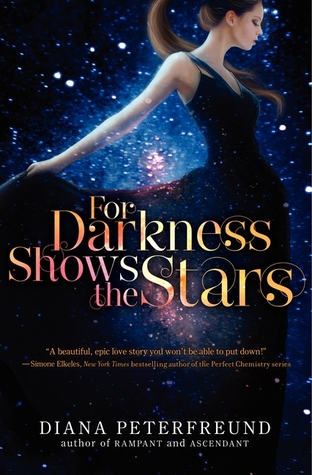 Description (from Goodreads): It's been several generations since a genetic experiment gone wrong caused the Reduction, decimating humanity and giving rise to a Luddite nobility who outlawed most technology.
Description (from Goodreads): It's been several generations since a genetic experiment gone wrong caused the Reduction, decimating humanity and giving rise to a Luddite nobility who outlawed most technology.Elliot North has always known her place in this world. Four years ago Elliot refused to run away with her childhood sweetheart, the servant Kai, choosing duty to her family's estate over love. Since then the world has changed: a new class of Post-Reductionists is jumpstarting the wheel of progress, and Elliot's estate is foundering, forcing her to rent land to the mysterious Cloud Fleet, a group of shipbuilders that includes renowned explorer Captain Malakai Wentforth--an almost unrecognizable Kai. And while Elliot wonders if this could be their second chance, Kai seems determined to show Elliot exactly what she gave up when she let him go. But Elliot soon discovers her old friend carries a secret--one that could change their society . . . or bring it to its knees. And again, she's faced with a choice: cling to what she's been raised to believe, or cast her lot with the only boy she's ever loved, even if she's lost him forever.
Review: For Darkness Shows the Stars is a retelling that does everything right. Though it superficially maintains the plot points and themes of Jane Austen's Persuasion, it goes beyond and creates a new darker, post-apocalyptic world. Some readers were not thrilled by how Peterfreund dealt with rough handled morality in the story, but I would disagree. I think her decision to narrow her focus on the society enriched my pleasure of reading Austen's original work considerably.
The world that Peterfreund created is very intricate and detailed. While it takes some time for the world to unfold and one to grasp the social hierarchy, I was never confused but rather engrossed. Elliot North is our heroine who happens to be a Luddite, one of the elite destined to care for the mentally Reduced remnant after human genetic engineering went catastrophically wrong.
Eliot is just as charming as she is in the original book. She is duty bound to her family and her society, but the more she works with the Reduced, the more she has begun to question her duty; her family seems more interested in luxurious leisure than estate management. Her people will starve without recourse to forbidden technology, and more and more Post-Reduced children are being born.
One of the "Posts" that we get to know intimately is that of Kai Wentworth, Eliot's secret best friend turned romantic interest. Kai is extremely intelligent and longs to explore the world outside his designated boundaries. He and Eliot both know their romance is doomed due to their social status and the gap of his disappearance has wounded our heroine deeply. Now he has returned with the fleet of Post explorers who could be the last hope for saving Elliot's heritage, but his bitterness toward Elliot may be hiding a more dangerous secret.
I loved how the author gave insight to Eliot and Kai's relationship by interspersing letters written by their younger selves. You can see how naturally their relationship grew and evolved unlike the Austen original which underplayed the romance and reducing it to body language and signals. His passion rubs off on Eliot and we understand where their spark comes from. Though I already knew the outcome of the story, I couldn't help but feel frustrated whenever an obstacle came in Eliot and Kai's happily ever after, which I think is a sign that the author knows how to write a romance.
While I liked that the society was different and original but still addressed the major themes of social and class distinctions, the book still felt a bit unfinished. I would have liked to see how the issues of slavery, anti-intellectualism and fundamentalist religion play out and hopefully it will be explored more when Peterfreund revisits the world in a different angle in her companion novel, Across a Star-Swept Sea, which will be released this fall. Readers looking for a swoony romance that isn't hindered by some depth, a steady pace, and a likable heroine should definitely check this book out.
Rating: 4.5 stars
Words of Caution: There are rumors of possible sexual situations involving a character but it's never really explored or clarified. Recommended for strong Grade 7 readers and up.
If you like this book try:
No comments:
Post a Comment